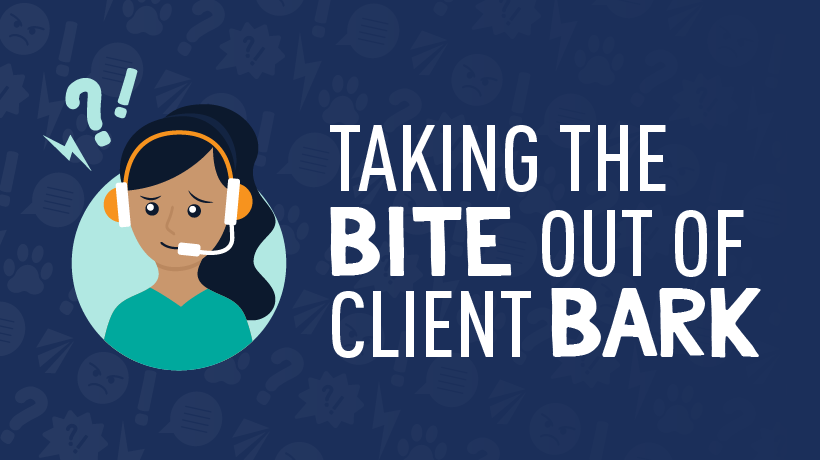
Taking the Bite Out of Client Bark
We’ve all been there: you’re three hours into a super-busy shift and Ms. Smith calls to get an appointment for her darling Fluffy. With other phone lines on hold and clients at your counter you are working as fast as you can—but it’s not fast enough for Ms. Smith, who becomes impatient and begins berating you. It’s not fair, it’s not fun, and you are doing your best. Why doesn’t she understand that?
At iVET360, we definitely understand. We’ve been in your Danskos, Crocs and sneakers. We’ve been the tech who got yelled at for simply trying to ensure the client had all their items. We’ve been the receptionist who did everything they could to squeeze a patient in just to get called nasty names. We’ve also been the practice manager who must juggle “the customer is always right” with “you will not treat my team with disrespect.”.
Add to that the procedure changes, pressures, and fears from the COVID-19 pandemic and it’s definitely an extremely stressful time to be working in the veterinary field.
I’m Rubber, You’re Glue
Resilience—the ability to bounce back after adversity—is your superpower. Too often, we see our all-star team members get beaten down after a poor client interaction. But if you and they can tap into what brought you to this field in the first place, you can overcome the frustration, anger, and hurt. When you do that, you become stronger. Your resilience is the reason your practice thrives, and it has enabled you to become:
- cat wrangler extraordinaire
- venipuncture veterans
- dog whisperers
- lab wizards
- surgical suite pilots
- a puppy’s best friend
- the comforting presence when a patient is about to cross the Rainbow Bridge
And keep this in mind: a client’s anger is usually more about them than about you. Odds are they’re lashing out due to fear or stress in their own life. Let them vent, then get them out the door as quickly as possible so you can move on.
No one is saying you must tolerate abuse but try not to take their frustration personally—no matter how much they push to make it that way. More often than not, those negative clients need our support more than we know.
“We get that it’s not fun dealing with upset or unreasonable clients. But you are so much bigger than a few negative moments with someone who lashed out.”
Resilience Training
There are many things you can do to engage in self-care and build your resilience, even during these difficult times. Here are a few suggestions:
Positive self-talk: This can feel weird if you’ve never done it before, but it is one of the most effective ways to help you feel better in the moment and get mentally stronger over time. Simply create a few positive affirmations for yourself, such as:
- I am awesome at my job
- I can do this
- This is stressful, but I can handle anything
- I can’t control their emotions or behavior, but I can control my reaction to them. I choose to react in a positive way
- I acknowledge that the client’s comments are hard to hear, but they do not reflect on who I truly am
- I am confident in my self-worth
- Tomorrow will be a better day / the next minute will be better than the last
The brain can be your worst enemy or your best friend. By stating these positive affirmations (out loud is always best, even quietly) the mind will eventually accept them as truth and change the way it reacts to stressors.
Try it out for a few weeks and see how you feel.
Recognize your strengths and failures. It’s easy to get so overwhelmed by whatever it is you’re struggling with that it feels like you are failing. This can lead to difficult thoughts and even imposter syndrome, where you start to doubt your own accomplishments and abilities. Instead of focusing only on your struggles, affirm what attributes make you awesome. Then you can reframe trip-ups as opportunities to learn and grow—nothing more.
Be realistic. There are five lines on hold, three people waiting to check out, and ten people fighting to check-in (or waiting curbside). Be honest with yourself: You can’t help all of them at once. This is when you take a quick moment, prioritize, and understand that as long as you do your personal best, then you’ve done everything you can for each person waiting. If you need help with how to prioritize, don’t hesitate to speak to your supervisor, practice manager, or practice owner.
Practice patience. During the COVID crisis, everyone is more stressed than before, including us! It’s easy to lose patience with each other in the hospital during normal times, and this is amplified right now. If someone is moving slower than you would like, give them the benefit of the doubt. If a team member makes a mistake, help them fix it and understand it wasn’t intentional. We all need to give each other the space to be human right now, and it is OK for you to ask the same of others.
Walk away when you need to. Ok, maybe don’t walk away from a client in the middle of a conversation (even an adversarial one), but when the interaction is over, it can be OK to tell your team “I need to take 5 minutes, I’ll be back.” Go to a quiet place (the bathroom works fine) and take a few deep breaths. Say a few affirmations 5-10 times, while practicing some breathing exercises. You’ll feel better, we promise.
Breathing exercises. We can’t recommend these highly enough. Conscious breathing is an excellent way to control both the physical and mental response we have to stress. Try one or more of these exercises for 60-120 seconds without stopping:
- Falling-out breath: Inhale deeply, filling your lungs with as much air as possible. At the top of your breath, take one more sip of air, then exhale with a big, audible sigh. Repeat.
- Box breath: To increase mindfulness, inhale for 4 counts. Hold your breath at the top for 4 counts, then exhale for 4 counts. Hold your breath again at the bottom for 4 counts. Repeat.
- Emptying breath: To calm your sympathetic nervous system, inhale to the count of 3, then exhale for 6 counts. Try to focus on releasing as much air as possible. Repeat.
Keep a journal. Journaling is not just for teenage girls—it’s actually a great way to release the things that are stressing you out and helps keep you grounded in the moment. You can write about whatever you want, say whatever you want, with no judgment or counter-thoughts. Don’t know what to write? Try this Google search for some great inspiration. You don’t have to stay on-topic, just use the topic as a launching point to get your emotions and thoughts out.
Practice gratitude. This is another one that may sound like it “isn’t your thing”—but it is scientifically proven to help improve quality of life, decrease stress, and increase resilience. Each day, state out loud or write down 3-5 things you are grateful for that day. It could be that the sun is shining, that your kids told you they loved you, or that you appreciate the unconditional love your pet provides. Nothing is too small to be grateful for. If you’re able, it can be especially helpful to express gratitude right after having a difficult conversation with an angry client. This helps refocus your brain on what is important.
Counter unhelpful thinking. When you’re having an especially tough day, it’s easy to get caught up in a negative spiral, where bad thoughts compound and turn a bad five minutes into a full-on bad day or even a bad week. Here are some ways to interrupt the cycle:
- Write down what you are thinking about when you get stressed and ask, “what is the WORST that can happen, and would I survive it?” and “What is the best that can happen?”
- Write down what is stressing you out and close the notebook for 5 minutes. Open it back up and read it as though your partner, child, or best friend was telling it to you. What advice would you give them to get through it? Now, refocus that advice on yourself.
- Take a moment to remember a hero, coach, or mentor that you admire or even one that has encouraged you in your life. This can even be a grandparent, parent, or sibling. Imagine what advice they would give you at this moment and how proud they would be of you and how far you’ve come in your life.
Finally—and this is important—NEVER forget just how badass you are! We get that it’s not fun dealing with upset or unreasonable clients. But you are so much bigger than a few negative moments with someone who lashed out.
For every bad interaction with a client you have, remember that there are several more pet parents who can’t wait to hear your voice, see your smile (even if it is behind that mask), and watch as you treat their furry family member as your own. It’s why we all do what we do—and it can’t be done without YOU.







